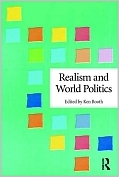| |||||
• polskie
• Zamów informacje o nowościach z wybranego tematu • kontakt |
REALISM AND WORLD POLITICSBOOTH K. (EDITOR)wydawnictwo: TAYLOR & FRANCIS, 2011, wydanie Icena netto: net price + 5% vat. This book contributes to the rethinking of realism through multiple analyses of the keys works of Kenneth Waltz, arguing that a sophisticated appreciation of realism is needed to truly understand world politics and International Relations. Bringing together a theoretically varied group of leading scholars from both sides of the Atlantic, this book is an outstanding appreciation of the work of realism’s most important theorist since the Second World War, and the persistent themes thrown up by his work over a half-century. The contributors do not engage with Waltz’s work as slavish disciples, but rather as positive critics, recognising its decisive significance in International Relations, while using the process of critical engagement to search for new or renewed understandings of unfolding global situations and new insights into long-standing problems of theory-building. The book will be of great interest to students of IR, foreign policy, security studies and politics. Table of Contents Preface 1. Realism Redux: Contexts, Concepts, Contests Ken Booth Part 1: Political Ideas in Waltzian Realism 2. Anarchy and Violence Interdependence Daniel Deudney 3. Bringing Realism to American Liberalism: Kenneth Waltz and the Process of Cold War Adjustment Michael Foley 4. Waltz, Realism and Democracy Michael C. Williams Part 2: Challenges to Structural Realist Theory 5. Waltz’s Theory of Theory Ole Waver 6. Structure? What Structure? Nicholas Onuf 7. ‘Big and important things in IR’: Structural Realism and the Neglect of Changes in Statehood Georg Sorensen 8. Reckless States and Realism John Mearsheimer Part 3: Realist Theories and Human Nature 9. Structural Realism, Classical Realism and Human Nature Chris Brown 10. Human Nature and World Politics: Rethinking ‘Man’ Neta Crawford 11. Women, the State, and War Jean Bethke Elshtain Part 4: War and Security, Causes and Consequences 12. Understanding Man, the State and War Hidemi Suganami 13. Lost in Transition: a Critical Analysis of Power Transition Theory Richard Ned Lebow and Benjamin Valentino 14. Hegemony, Equilibrium and Counterpower: a Synthetic Approach Cornelia Beyer 15. Nuclear Weapons in Waltz’s World: More Trust may be Better Nicholas J. Wheeler Part 5: Continuity and Change in the International and in the World 16. How Hierarchical can International Society be? Ian Clark 17. Waltz and World History: the Paradox of Parsimony Barry Buzan and Richard Little 18. Human Interconnectedness Andrew Linklater Part 6: Conclusion 1 9. International Politics: the Inconvenient Truth Ken Booth 368 pages, Paperback Księgarnia nie działa. Nie odpowiadamy na pytania i nie realizujemy zamówien. Do odwolania !. |


